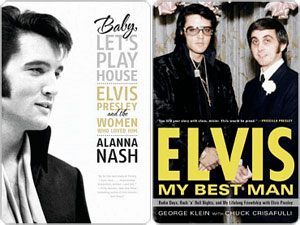Two new Elvis Presley books will be released as e-books; "Elvis: My Best Man: Radio Days, Rock 'n' Roll Nights, and My Lifelong Friendship with Elvis Presley" by Chuck Crisafulli, George Klein and "Baby, Let's Play House: Elvis Presley and the Women Who Loved Him" by Alanna Nash. Both titles will be available for download on January 5, 2010.
Library Journal on George Klein's biography:
It is difficult to imagine there is anything new to learn about Elvis. Since his death in 1977, people from his wife, Priscilla, to his bodyguards have written about him. In the last five years, there has been at least one book about the King published each year. Klein, whose personal mission is to keep Elvis's memory alive and who knew Elvis since the eighth grade and considered him his best friend, offers firsthand insight into Elvis's early years. One wonders why he waited so long to tell his story—his answer is that he didn't want to add to the "clamor," but now he wants everyone to know that Elvis was a smart and funny friend. Klein tells his own story, too, of making his way to the top of the disc jockey ladder. VERDICT Klein's constant use of dialog is grating, but demand for all things Elvis continues. This may be sought out by those who enjoyed Jerry Schilling's Me and a Guy Named Elvis (also cowritten with Crisafulli).—Rosellen Brewer, Sno-Isle Libs., Marysville, WA
Publishers Weekly on Alana Nash's book:
Nash culls reminiscences from long-term girlfriends, starlets like Ann-Margret and Cybill Shepherd, and assorted strippers, showgirls and groupies for this gossipy, besotted biography of rock's original sex god. They attest to the allure that had females lining up for access to the young Elvis's bed: devastating looks, pelvic gyrations and a bad-boy sneer combined with a romantic soul, sublime kissing technique and a courtliness that lulled parents into handing over their underage daughters. (He was attracted to 14-year-old brunettes, Nash argues, like future wife Priscilla.) And there's the indefinable magnetism—i.e., celebrity—that kept them coming through the drugs and debauchery, the bizarre monologues and random gunplay, the impotence and incontinence and vomit and bloat of the King's declining years. Nash's mix of breathless melodrama (“his voice was soft and sensuous, and he had a mischievous grin on his face, and he was looking straight at her”) with rote psychoanalysis (“Elvis could never really let go of [his mother] Gladys”) often reads like a fan magazine. Her shallow but vivid portrait nonetheless manages to evoke much of what made Elvis so enthralling. (Jan. 5)
